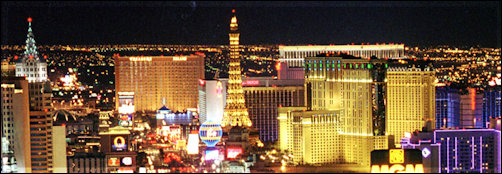It happened in Nevada first, but it could come to Virginia eventually — the effort by major electricity consumers to bypass their local utilities and purchase power from wholesale electric markets.
Three big casino companies — Wynn Resorts, MGM Resorts International and Las Vegas Sands — say they could slash millions of dollars from their electric bills if they could buy power directly from merchant power producers, reports the Wall Street Journal. Power-hungry casinos would like to use more renewable energy to live up to commitments to shareholders and customers but they say NV Energy, the monopoly utility, charges too much for green power. They could acquire the energy far cheaper by contracting directly with independent power producers.
NV Energy is doing everything it can to thwart the departure of some of its largest customers, and so far regulators have obliged. But as long as it’s possible to purchase solar power wholesale for 4 cents per kilowatt-hour (and conventional power for 3.5 cents per kilowatt-hour) and the company charges big commercial clients between 9 and 10 cents per kilowatt-hour, big consumers will have enormous incentive to cut their own deals.
The WSJ didn’t explain the regulators’ thinking, but it should be obvious. The loss of major customers would throw the burden of supporting the vast sunk cost of the existing electric-generating infrastructure onto remaining customers, forcing the utility to raise rates in order to prop up profit margins. And Nevada needs a financially healthy power company to maintain a reliable source of electric power for those who don’t have the size and clout to cut their own deals with merchant power companies.
“The same struggle is occurring across the country,” writes the WSJ, “as large power users watch wholesale energy prices fall while their utility bills rise.” Some states allow residents and businesses to buy their electricity from competitive suppliers. While favoring the power companies, Virginia’s regulatory system does allow options.
Wrote the SCC in its 2015 report on Electric Utility Regulation in September:
The ability of most customers to purchase electric generation service from competing suppliers has been limited. The Regulation Act permits large customers (those exceeding 5 MW of electricity demand) to shop among licensed competitive service providers (“CSP”), and nonresidential customers may apply with the Commission to aggregate load up to the 5 MW threshhold to receive services from a CSP. Residential retail customers currently have the statutory right under the Regulation Act to purchase electric generation service from CSPs selling electric energy “provided 100% from renewable energy.”
The SCC lists 29 such CSPs licensed to sell 100% renewable energy in Virginia.
These retail aggregators can purchase green power from the PJM wholesale market, of which Virginia is a part, but they don’t appear to have made any meaningful inroads. Whether that’s due to a lack of consumer interest or an inability to deliver green energy at a competitive price, I don’t know.
As for big customers, Amazon Energy Services recently contracted with a merchant producer to generate solar electricity in the Eastern Shore for data centers in Northern Virginia. But Amazon is holding everyone to a non-disclosure agreement, so the terms of the detail are not generally known. Acbar, a frequent contributor to the Bacon’s Rebellion comments section, tells me that many of the documents outlining the terms of the deal are publicly available, but I have not had time to track them down. In any case, I have not risen to a level of competency to decipher the meaning of these hyper-technical documents, and I’m not sure, given all the other issues to write about, that it’s worth the effort.
But the electric power industry is changing fast, and my priorities could change with it.
— JAB



